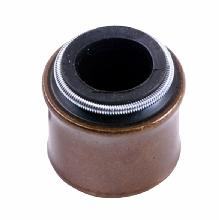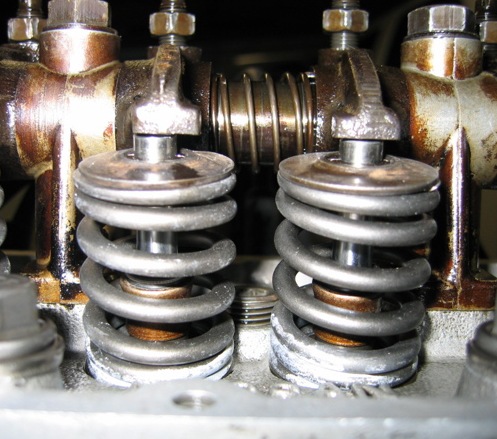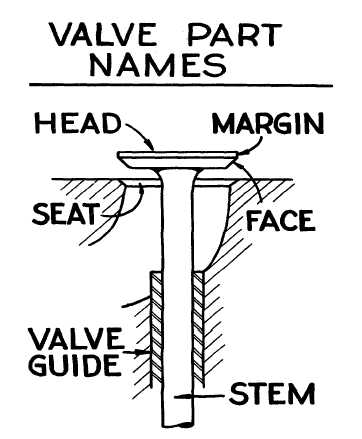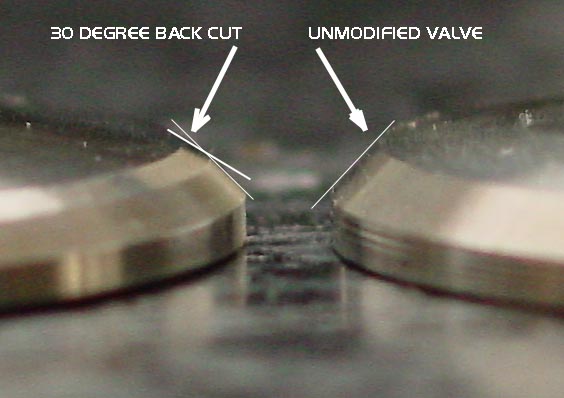Datsun 1200 uses traditional 8mm stem diameter poppet valves.
Contents |
Maintenance
See main article: Valve adjustment
Removal & Installation
- Remove the Cylinder Head
- Compress the valve springs and remove the keepers, then the springs
- Slide valve out of the head
- Coat valve mating surface with grinding compound. Slide new valve in and lap the valve. Clean the compound off.
- If needed, remove old seals and put new seals on
- Re-fit the valve springs
Stem Oil Seal
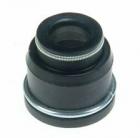

Specifications
* Intake valve head diameter: 35 mm * Exhaust valve head diameter: 29 mm * Stem diameter: 8 mm nominal (~7.95 actual) * Overall length: 103.80 mm * Seat angle: 45 degrees * Head style: standard * Stem end: NG
Part Numbers
* 13201-H1000 VALVE-INTAKE [35mm] * 13202-18000 VALVE-EXHAUST [29mm] * 13201-H2300 VALVE-INTAKE A12GX [35mm] * 13202-H2300 VALVE-EXHAUST A12GX [29mm]
Valve Keepers
Valve Spring Retainer Keeper (Valve lock) * Stem diameter 0.252 * 7 degree angle * SEALED POWER Part # VK215 * BECK/ARNLEY Part # 0230045
Interchange * 1976-1979 Buick Opel/Isuzu 1.8 * 1976-1978 Chevrolet Luv/Isuzu 1.8 * 1981-1995 Isuzu, various models * 1988-1996 Honda/Isuzu 2.6 * Datsun A-series * Datsun L-series 4 and 6 * Datsun Z-series
13209-18000 RETAINER-VALVE SPRING (8) <> 13209-H2300 <> 13209-H2301 13209-H2302 RETAINER-VALVE SPRING (8) 0772- [without O-ring grooves] 13209-H2302 RETAINER-VALVE SPRING (8) B210
13210-73400 COLLET-VALVE 1 (16) A12 (MATERIAL C40) < 13210-U0100 13210-H1000 COLLET-VALVE 1 (16) A12 0272- <> 13210-U0100 13210-U0100 COLLET-VALVE (MATERIAL C1010) B210 > 13210-73400 $1.13 USD
Valve Guides
Valve Springs
Valve Angles
A12 came from the factory with a 3-angle valve job. Accept no less.
SEATS
* Intake: 75° + 45° + 22.5° max. dia. @ 45°: 34.6mm contact width = 1.3mm * Exhaust: 75° + 45° max. dia. @ 45°: 28.6mm contact width = 1.8 mm
VALVES * Intake 30° + 45°30' backcut * Exhaust 20° + 45°30' backcut * Minimum valve head thickness 0.5 mm
Nissan Competition recommend these angles, which are the ones commonly used by many manufacturers in recent times:
60° + 45° + 30°
The seat width is a compromise between good flow (narrow width) and good heat transfer (wide seat). So exhaust valves need a wider seat contact area. And so do hotter engines. The factory values are what Nissan Competition recommended (although at times the recommendation varied).
The factory used a 45°30' cut on the seat and a plain 45 on the valve. The slight difference between seat angle and valve angle is called interference angle and helps with initial fit. It may also help with longevity.
Reportedly there is no turbulence if the angles are kept to 15 degrees or less. So the best is the 5-angle:
[90 to] 75 + 60 + 45 + 30 + 15 [to 0]
The downside is extra labor. And the 3-angle gains a lot over a 1-angle job, so except for racing, very few do a 5-angle (Honda and Mitsibushi have reportedly done them on production cars).
Others
For other A-series valves (A14, etc) and for competition valves, see:
* Cylinder_Head_Identification#Valves * Big Valves

![[Datsun 1200 encyclopedia]](/wiki/upload/wiki.png)
